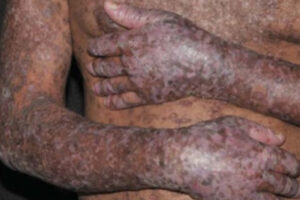Oncology
Chronic Graft-versus-Host Disease
Gaps and Opportunities in the Treatment of Chronic Graft-versus-Host Disease
Chronic graft-versus-host disease (cGVHD) significantly impacts patients and can lead to considerable excess long-term morbidity and mortality. Our featured experts review some of the clinical gaps and opportunities in the management of this potentially debilitating condition.
What excites me in the field of cGVHD is the idea of better prevention, improved graft sculpting, and potential advancements in cellular therapeutics that harness the natural yin and yang of pro- and anti-inflammatory immune responses that people possess at a steady, healthy state. I think that it will be a very exciting future direction for the field if we can successfully replicate this state in our patients who are starting with an immunologically blank slate at the time of transplant. It would be ideal to remove the donor cells that contribute to cGVHD risk from the graft or to allow them to develop immune tolerance for recipient alloantigens that cause cGVHD. Then it would no longer be necessary to use the blunt instrument of systemic immunosuppression that we currently use.
The ability to make an early cGVHD diagnosis based on standardized prognostic prediction metrics or novel patient reporting tools, and then target specific pathways with combinations of agents, would be a wonderful advance for the field. I do not think that we are at the point of success where we need to be yet, which I define as a greater than 90% success rate.
I think one big challenge is that cGVHD has largely been an ignored disease. People were not that interested, which may partly be due to the fact that there was not much that could be done for these patients. Over the past decade, however, and with a concerted effort, transplant specialists and other clinicians have learned how to better identify and assess for cGVHD. In tandem, awareness has increased through events such as the National GVHD Awareness Day. I think that this is very important because it underscores how important it is to continue research for this disease. We now have newer US Food and Drug Administration (FDA)–approved agents and more that are in development that offer promise to many patients, but people are still getting cGVHD.
Essentially, in my view, we all want to prevent cGVHD even more than we want to treat it. Therefore, I think that the biggest challenge is to find strategies to prevent patients from developing GVHD without increasing any toxicities. We must continue our research and development efforts, and we cannot begin to slow down until our success rate is 90%.
For those of us who have been practicing in this field for some time, cGVHD has been a terrible disease with a significant negative impact on our patients. Until recently, we, unfortunately, could not offer very much to our patients to provide symptom relief. However, we now have the development of new agents that give us the opportunity to see better responses, which is really exciting.
I will highlight 3 areas that I think are important to focus on in future research on the management of cGVHD. First, we need more information on the long-term impact of the newer drugs. A lot of the clinical studies that are being done for FDA approval are relatively short-term trials assessing responses for 3 to 6 months. We need to know the longer-term impact of treatment on both response rates and toxicity. I am especially interested in understanding the infectious toxicity of immunosuppressive agents when used longer-term. So, I think that analyzing longer-term follow-up data from the initial studies that we have will be important to gain some insight into what happens over time with our patients.
Second, we need more objective assessments, such as biomarkers or other standardized assessments, to better evaluate where patients are in their clinical course. Maybe it does not have to be a fancy blood test, but it could be something simple such as patients routinely completing spirometry at home and tracking their results over time. This might give us insights into where patients are.
Third, now that we have newer agents for cGVHD, we need to use them in rational combinations for our patients with the most challenging cases. I think that many of us are doing this anecdotally, but it would be nice if we had some way to capture our experience in a more organized and methodological way so that others may benefit. One of the beauties of our field is that we already collect these types of data, and it is really important that we disseminate these data, especially in the context of carefully constructed trials. I think that this would be very helpful because patients continue to have very debilitating and even life-threatening problems post transplant, and we need to address their needs.
Buxbaum NP, Socié G, Hill GR, et al. Chronic GvHD NIH Consensus Project biology task force: evolving path to personalized treatment of chronic GvHD. Blood Adv. 2023;7(17):4886-4902. doi:10.1182/bloodadvances.2022007611
DeFilipp Z, Couriel DR, Lazaryan A, et al. National Institutes of Health Consensus Development Project on criteria for clinical trials in chronic graft-versus-host disease: III. The 2020 treatment of chronic GVHD report. Transplant Cell Ther. 2021;27(9):729-737. doi:10.1016/j.jtct.2021.05.004
Pidala J, Kitko C, Lee SJ, et al. National Institutes of Health Consensus Development Project on criteria for clinical trials in chronic graft-versus-host disease: IIb. The 2020 preemptive therapy working group report. Transplant Cell Ther. 2021;27(8):632-641. doi:10.1016/j.jtct.2021.03.029
Saidu NEB, Bonini C, Dickinson A, et al. New approaches for the treatment of chronic graft-versus-host disease: current status and future directions. Front Immunol. 2020;11:578314. doi:10.3389/fimmu.2020.578314
Williams KM, Inamoto Y, Im A, et al. National Institutes of Health Consensus Development Project on criteria for clinical trials in chronic graft-versus-host disease: I. The 2020 etiology and prevention working group report. Transplant Cell Ther. 2021;27(6):452-466. doi:10.1016/j.jtct.2021.02.035
Wolff D, Radojcic V, Lafyatis R, et al. National Institutes of Health Consensus Development Project on criteria for clinical trials in chronic graft-versus-host disease: IV. The 2020 highly morbid forms report. Transplant Cell Ther. 2021;27(10):817-835. doi:10.1016/j.jtct.2021.06.001













